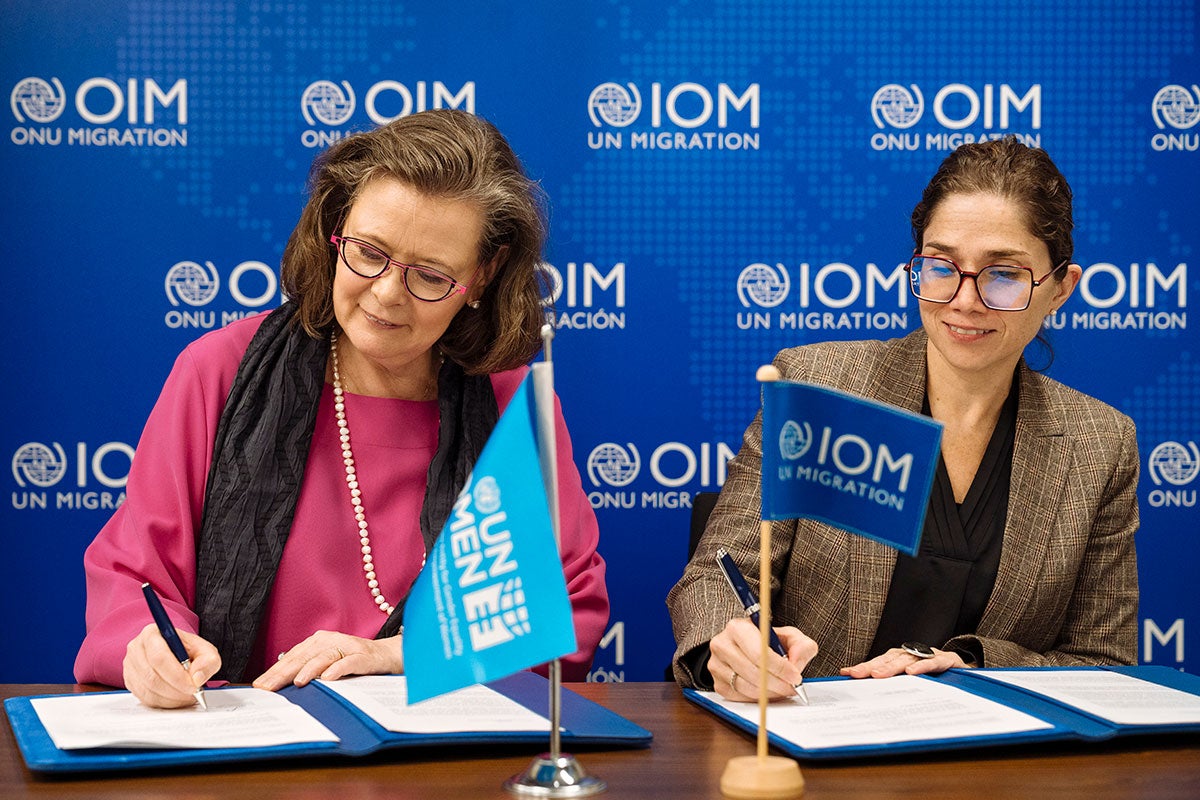Migration has long been a crucial driver of global development, with millions of people seeking better opportunities, safety, and stability across borders. Every aspect of migration is influenced by a person's gender: from the reasons for migrating, the information received before leaving, and the journeys embarked on, to integration in countries of destination and return, the work performed, and access to services.
Yet, international migration governance has been largely gender-blind, therefore reproducing or reinforcing existing gender and race inequalities, exposing women and girls to a greater risk of discrimination and human rights violations, including gender-based violence and trafficking. Women, who represent 48.1 per cent of international migrants, are more likely than men to face gender-specific barriers in accessing safe and regular migration pathways.
This is why the International Organization for Migration (IOM) and UN Women signed a new Strategic Collaboration Agreement solidifying the organizations' united commitment to advancing gender equality and the empowerment of women and girls in migration and displacement contexts.
"Although global statistics on migration are increasingly available, they often fail to capture the gendered dimensions of migration, including the specific experiences of women and girls," said Catalina Devandas IOM's Representative of the Director General Office of Partnerships, Advocacy, and Communication. "This partnership with UN Women aims to strengthening our relationship and ensure the rights of women and girls is at the heart of all we do."
Women are overrepresented in informal and low-wage sectors, such as domestic work, agriculture, and care services, and are likely to face precarious working conditions and limited access to social protection. Migrant women face additional barriers when it comes to financial inclusion. Many struggle to access banking services, loans, and digital financial tools due to a combination of legal restrictions, mobility challenges, and gender-based discrimination. In times of conflict and displacement, women and girls are disproportionately affected by the breakdown of services, such as healthcare and education, which are critical to their well-being and empowerment. Furthermore, women and girls are also disproportionately affected by climate-related disasters.
"UN Women and IOM's renewed partnership-founded on ongoing collaboration across several countries-will contribute to gender-responsive migration governance, labor mobility, and humanitarian responses and advance our joint commitments to women's leadership and protection in crises," said UN Women Deputy Executive Director Kirsi Madi.
As climate change intensifies, the number of women and girls displaced by environmental factors is expected to rise, exacerbating existing inequalities. Yet, women are powerful agents of change, driving development in their countries of origin and in their host communities. Women's remittances are often invested in education, healthcare, and local investments, playing a crucial role in poverty reduction and community development.
It is, therefore, imperative that migration governance and humanitarian responses adopt a gender-responsive approach, one that accounts for the diverse experiences of women and girls, as well as the organizations that represent them. This involves recognizing their agency, leadership, and capacity to drive positive change. Investing in gender equality in migration is not only a matter of human rights; it is a cornerstone for building stronger, more resilient communities. Humanitarian responses that centre the leadership of women and girls ensure more equitable outcomes. Policies must prioritize safe and regular migration pathways, ensure access to decent work and social protection, and combat gender-based violence and trafficking.
Signed at the IOM office in Geneva, the new agreement brings stronger gender-responsive migration policies and humanitarian responses; enhances gender data collection and analysis to drive policies and responses; and helps with the implementation of joint programs in humanitarian and development contexts. Through their partnership, IOM and UN Women will not only address the immediate needs of migrants, internally displaced women, and those in host communities; but will also contribute to their rights and empowerment as agents of change.







